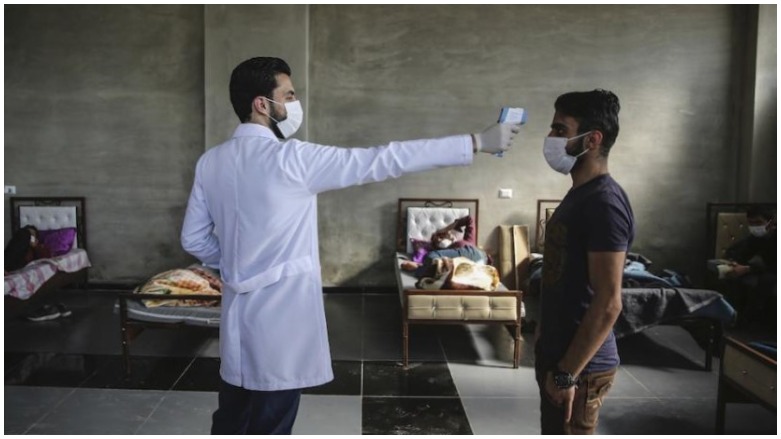HRW fears Damascus won’t distribute COVID-19 vaccine to Syria’s northeast

ERBIL (Kurdistan 24) - International aid groups should support the widest and most equitable distribution of coronavirus vaccines possible across Syria, including all areas controlled by various non-state groups, Human Rights Watch (HRW) said in a report on Tuesday.
According to the New York-based human rights watchdog, on Dec. 15, the Syrian government submitted an official request to participate in the COVAX facility, a global initiative to expand COVID-19 vaccine access led by the World Health Organization, the Coalition for Epidemic Preparedness Innovations (CEPI), and the Gavi Vaccine Alliance. However, it is unclear whether the submitted plan includes all parts of the country.
On Jan. 21, it continued, the Syrian health minister said that among the most important conditions for Syria’s procurement of the vaccine is to ensure that it does not “impact Syria’s sovereignty,” suggesting that the government is unlikely to have included the northeast – which it does not control – in its plans.
“There are significant fears that the Syrian government will not give the vaccine to northeast and northwest Syria. We have seen this before and we don’t know if the plan covers all of Syria,” Sara Kayyali, Syria researcher at HRW, told Kurdistan 24.
Rules of cross-border humanitarian operations in Syria require the UN to seek Damascus’ permission for aid destined for northeast Syria.
The Syrian government has often withheld or delayed such permission, prohibited certain medical and other supplies from reaching non-government-held areas, and also prevented UN agencies from carrying out essential projects in these areas. Damascus also refused to allow UN agencies to establish COVID-19 testing labs in northeast Syria.
Furthermore, the logistics of aid deliveries are significantly slower than other cross-border alternative routes, requiring travel across longer distances and in less feasible conditions, said Kayyali, who said that the HRW is concerned that if the vaccine is allocated to the Syrian government, there will be other significant delays in distribution.
“There are medical supplies and drug shortages, there are delays in getting the convoys across, and that's really had that had an impact on the ground. So our concern really is that should the sort of all of the vaccines be allocated centrally through the Syrian government that the same delays the same biases in distribution are going to be seen with the vaccine.”
“The solution really is for the vaccine suppliers to allow international organizations that are still in northeast and northwest Syria to step up to take this role, even where there is no cross border mechanism currently functioning.”
The local administration in northeast Syria faces huge humanitarian challenges due to the shutdown of the only UN crossing to the northeast of al-Yarubiyai, located on the border of Iraq, in Jan. 2020, leading to various shortages, most notably of medicine and medical supplies.
In December, Russia and China both vetoed a UN Security Council resolution that would have kept the crossing open.
Read More: Russia again blocks vital aid to millions in northern Syria
In July, the UN Security Council voted to leave one crossing open between Turkey and northwest Syria, but al-Yarubiya remains closed. UN agencies providing aid to northeast Syria are now reliant on Damascus for delivery and services across areas of control.
Governing authorities in most of northwest Syria told HRW that they too have submitted a formal proposal to COVAX for their areas, but the specifics of these plans have not yet been made public.
Northeast Syria, though, currently has no arrangement to obtain vaccines independently. Rebel groups there that are also supported by Turkey could help the populations of these areas to obtain vaccines. However, northeast Syria has no such support.
Luqman Ahmi, spokesperson for local Autonomous Administration of North and East Syria (AANES) told Kurdistan 24 that northeast Syria “urgently needs vaccines for COVID-related complications. There is a significant number of patients infected with the coronavirus in Northeast Syria. Despite the lack in medical resources we have been able to isolate the patients and mitigate the risks in order to save our people.”
“We cannot rely on the Syrian regime to deliver these vaccines to our region. We have had similar experiences with them. In this regard, we call on the WHO and other international organizations – who are working to provide vaccines to the conflict areas – to include Northeast Syria in their planning.”
“The delivery of COVID vaccines should be through border gates that are not under the control of the Syrian regime or the Turkish-backed mercenaries,” he said. “If not, these vaccines may not reach Northeast Syria.”
“Therefore, we demand that Tel Kocher [al-Yaroubia] border gate to be reopened, so that humanitarian, medical and COVID-related aid can directly arrive in Northeast Syria,” Ahmi concluded.
Editing by John J. Catherine